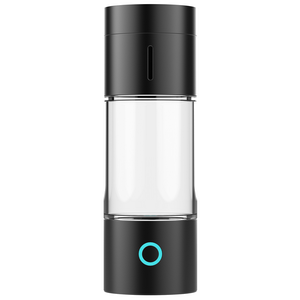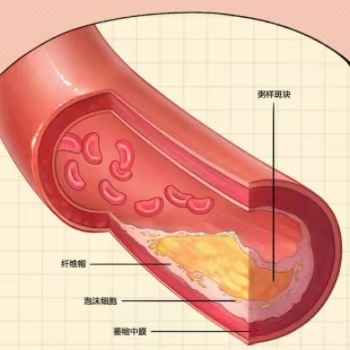Atherosclerosis is a common cardiovascular disease, characterized mainly by thickening and hardening of the arterial wall, loss of elasticity, and narrowing of the lumen, which seriously threatens human health. In recent years, small molecule hydrogen-rich water has shown potential efficacy in the field of atherosclerosis prevention and treatment due to its unique biological properties.
Antioxidation and Protection of Vascular Endothelial Cells: Oxidative stress can damage vascular endothelial cells and trigger atherosclerosis. Small molecule hydrogen-rich water can selectively neutralize highly toxic free radicals such as hydroxyl radicals (·OH) and peroxynitrite anions (ONOO-), reduce oxidative damage to the vascular endothelium, maintain the normal function of endothelial cells, and inhibit the inflammatory process.
Promoting Vascular Relaxation and Improving Hemodynamics: Small molecule hydrogen-rich water can promote the release of nitric oxide by vascular endothelial cells, relax vascular smooth muscle, dilate blood vessels, reduce blood pressure, improve hemodynamics, and also inhibit platelet activation and aggregation, reducing the risk of thrombosis.
Regulating Lipid Metabolism and Reducing Lipid Accumulation: Small molecule hydrogen-rich water can regulate the expression of genes related to lipid metabolism, enhance the liver's reverse transport capacity of cholesterol, reduce the levels of atherosclerotic lipid components in the blood such as low-density lipoprotein and triglyceride, increase high-density lipoprotein, and reduce lipid accumulation in the vascular wall.
Anti-inflammation and Stabilization of Atherosclerotic Plaques: Inflammation persists throughout the process of atherosclerosis. Small molecule hydrogen-rich water can inhibit the activation and infiltration of inflammatory cells, reduce the levels of pro-inflammatory factors such as tumor necrosis factor -α and interleukin - 6, increase the secretion of anti-inflammatory factors such as interleukin - 10, regulate the inflammatory balance, stabilize plaques, and reduce the likelihood of acute cardiovascular events.
![]()
![English]() English
English ![Arabic]() Arabic
Arabic ![Portuguese]() Portuguese
Portuguese ![Chinese]() Chinese
Chinese ![French]() French
French ![Russian]() Russian
Russian ![Spanish]() Spanish
Spanish ![German]() German
German ![Vietnamese]() Vietnamese
Vietnamese ![Indonesian]() Indonesian
Indonesian ![Korean]() Korean
Korean ![Japanese]() Japanese
Japanese ![Italian]() Italian
Italian ![Urdu]() Urdu
Urdu ![Hindi]() Hindi
Hindi ![Hebrew]() Hebrew
Hebrew ![Thai]() Thai
Thai ![Bengali]() Bengali
Bengali ![Turkish]() Turkish
Turkish ![Dutch]() Dutch
Dutch ![Polish]() Polish
Polish ![Amharic]() Amharic
Amharic ![Bulgarian]() Bulgarian
Bulgarian ![Dhivehi]() Dhivehi
Dhivehi ![Finnish]() Finnish
Finnish ![Khmer]() Khmer
Khmer ![Hungarian]() Hungarian
Hungarian ![Kinyarwanda]() Kinyarwanda
Kinyarwanda ![Luganda]() Luganda
Luganda ![Maori]() Maori
Maori ![Malay]() Malay
Malay ![Norwegian]() Norwegian
Norwegian ![Chichewa]() Chichewa
Chichewa ![Oromo]() Oromo
Oromo ![Persian]() Persian
Persian ![Romanian]() Romanian
Romanian ![Sanskrit]() Sanskrit
Sanskrit ![Somali]() Somali
Somali ![Serbian]() Serbian
Serbian ![Swedish]() Swedish
Swedish ![Afrikaans]() Afrikaans
Afrikaans ![Aymara]() Aymara
Aymara ![Azerbaijani]() Azerbaijani
Azerbaijani ![Belarusian]() Belarusian
Belarusian ![Burmese]() Burmese
Burmese ![Catalan]() Catalan
Catalan ![Cebuano]() Cebuano
Cebuano ![Czech]() Czech
Czech ![Danish]() Danish
Danish ![Filipino]() Filipino
Filipino ![Irish]() Irish
Irish ![Hausa]() Hausa
Hausa ![Haitian]() Haitian Creole
Haitian Creole ![Igbo]() Igbo
Igbo ![Icelandic]() Icelandic
Icelandic ![Javanese]() Javanese
Javanese ![Lao]() Lao
Lao ![Lingala]() Lingala
Lingala ![Dutc]() Dutc
Dutc ![Quechua]() Quechua
Quechua ![Sinhala]() Sinhala
Sinhala ![Sindhi]() Sindhi
Sindhi ![Yoruba]() Yoruba
Yoruba 






 Arabic
Arabic Portuguese
Portuguese Chinese
Chinese  French
French Russian
Russian Spanish
Spanish German
German Vietnamese
Vietnamese Indonesian
Indonesian Korean
Korean Japanese
Japanese Italian
Italian Urdu
Urdu Hindi
Hindi Hebrew
Hebrew Thai
Thai Bengali
Bengali Turkish
Turkish Dutch
Dutch Polish
Polish Amharic
Amharic Bulgarian
Bulgarian Dhivehi
Dhivehi Finnish
Finnish Khmer
Khmer Hungarian
Hungarian Kinyarwanda
Kinyarwanda Luganda
Luganda Maori
Maori Malay
Malay Norwegian
Norwegian Chichewa
Chichewa Oromo
Oromo Persian
Persian Romanian
Romanian Sanskrit
Sanskrit Somali
Somali Serbian
Serbian Swedish
Swedish Afrikaans
Afrikaans Aymara
Aymara Azerbaijani
Azerbaijani Belarusian
Belarusian Burmese
Burmese Catalan
Catalan Cebuano
Cebuano Czech
Czech Danish
Danish Filipino
Filipino Irish
Irish Hausa
Hausa Haitian Creole
Haitian Creole Icelandic
Icelandic Javanese
Javanese Lao
Lao Lingala
Lingala Dutc
Dutc Quechua
Quechua Sinhala
Sinhala Sindhi
Sindhi Yoruba
Yoruba